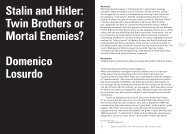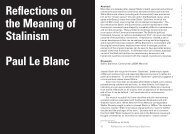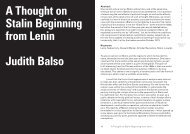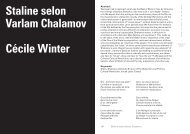adrian
adrian
adrian
- No tags were found...
Create successful ePaper yourself
Turn your PDF publications into a flip-book with our unique Google optimized e-Paper software.
In light of Henry Allison’s quite plausible interpretation ofthe “Transcendental Deduction,” according to which Kant positsa “reciprocity thesis” holding that the transcendental unity ofapperception entails a mutual, two-way interdependency of knowingsubject and known object upon each other (with the claim that thesubject can know itself as a unifying producer only in and through theproduced unity reflected back to it by the objects it itself is responsiblefor unifying), Hegel’s absolute idealist appropriation of Kant’ssubjective idealist transcendental unity of apperception cannot butinvolve a fundamental transformation of the sense and implicationsof the latter. 50 A famous one-liner from the Critique of Pure Reason,one directly related to what Allison has in view apropos the allegedreciprocity between apperceiving subjectivity and apperceivedobjectivity, has it that, “The a priori conditions of a possible experiencein general are at the same time conditions of the possibility of theobjects of experience.” 51 With his absolute idealism as, in part, asublation of subjective idealism in its anti-realist, deontologized onesidedness,Hegel arguably radicalizes the reciprocity at the base ofKant’s “Transcendental Deduction” such that the (epistemological)truthfulness of this just-quoted one-liner from the first Critique must becounterbalanced by also positing the equal (ontological) truthfulnessof its precise inversion: “Conditions of the possibility of the objectsof experience (i.e., the “in itself” [an sich] delineated in the “ObjectiveLogic” prior to the “Subjective Logic” of “The Doctrine of the Concept”)are at the same time the a priori conditions of a possible experience ingeneral (i.e., the “in and for itself” [an und für sich] delineated in the“Subjective Logic” only after the “Objective Logic”).”Additional clarity and concreteness can be lent to this by anotherreturn to Hegel’s Phenomenology of Spirit: specifically, the openingof its third section on “Reason” (Vernunft) (Ameriks and Harris bothcorrectly note that Pippin, although preserving a crucial role for thePhenomenology in the mature [post-1807] Hegelian System, 52 ignoresthis section in his predominant focus on the preceding first two sectionsdealing with “Consciousness” [Bewußtsein] and “Self-Consciousness”CRISIS&CRITIQUE#3[Selbstbewußtsein] 53 ). In the wake of the dialectics running fromConsciousness through Self-Consciousness, the Reason arising at thestart of this third section is characterized by Hegel as being “certain”—however, at this juncture, it still has yet to prove the “truth” (Wahrheit)of this its certainty (Gewißheit) through the tests of its experiences—of the existence of fundamental structural isomorphisms between itsminded subjectivity and worldly objectivity. 54 Reason balances out thelop-sided preponderances of object and subject posited by the earlierfigures of Consciousness and Self-Consciousness respectively. It doesso by adopting the view, into which it has been driven by the precedingdialectical moments sublating the shapes in the Phenomenologycoming before it, that:…self-consciousness (Selbstbewußtsein) and being (Sein) arethe same essence (Wesen), the same, not through comparison,but in and for themselves (an und für sich). It is only the onesided,spurious idealism (einseitige schlechte Idealismus) thatlets this unity (Einheit) again come on the scene as consciousness(Bewußtsein), on one side, confronted by an in-itself (Ansich), onthe other. But now this category or simple (einfache) unity of selfconsciousnessand being possesses difference in itself; for itsessence is just this, to be immediately one and selfsame inotherness (Anderssein), or in absolute difference (absoluteUnterschiede). The difference therefore is, but is perfectlytransparent, and a difference that is at the same time none.It appears as a plurality of categories. 55To begin with, the objection to Kantian transcendental idealismas subjectivism in this passage is so obvious as not to requiredeciphering and explanation. Moreover, Hegel’s wording here inthe Phenomenology is echoed in Pippin’s preferred later moment ofthe Science of Logic, thus indicating that the latter text’s kind wordsfor the transcendental unity of apperception of the B-Deduction aresignificantly tempered by a rejection of the type of idealism to whichKant shackles this transcendentally deduced unity. In the Science ofLogic, Hegel recasts Kant’s transcendental unity of apperception as (toCRISIS&CRITIQUE#350 Kant 1998, B136-139 (pp. 248-250); Allison 1983, pp. 144-145.51 Kant 1998, A111 (p. 234).52 Pippin 1988, p. 17; Pippin 1989b, pp. 38, 91-94, 178, 256; Pippin 1989a, p. 32; Pippin 1990, pp.843-844, 847-848.53 Ameriks 1992, pp. 199-200; Harris 1989, p. 27.54 Hegel 1970c, pp. 178-181; Hegel 1977c, pp. 139-142.55 Hegel 1970c, pp. 181-182; Hegel 1977c, p. 142.384 “Where to Start?: Robert Pippin, Slavoj Žižek...385“Where to Start?: Robert Pippin, Slavoj Žižek...






